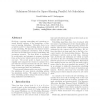Free Online Productivity Tools
i2Speak
i2Symbol
i2OCR
iTex2Img
iWeb2Print
iWeb2Shot
i2Type
iPdf2Split
iPdf2Merge
i2Bopomofo
i2Arabic
i2Style
i2Image
i2PDF
iLatex2Rtf
Sci2ools
JSSPP
2005
Springer
2005
Springer
Unfairness Metrics for Space-Sharing Parallel Job Schedulers
Sociology, computer networking and operations research provide evidence of the importance of fairness in queuing disciplines. Currently, there is no accepted model for characterizing fairness in parallel job scheduling. We introduce two fairness metrics intended for parallel job schedulers, both of which are based on models from sociology, networking, and operations research. The first metric is motivated by social justice and attempts to measure deviation from arrival order, which is perceived as fair by the end user. The second metric is based on resource equality and compares the resources consumed by a job with the resources deserved by the job. Both of these metrics are orthogonal to traditional metrics, such as turnaround time and utilization. The proposed fairness metrics are used to measure the unfairness for some typical scheduling policies via simulation studies. We analyze the fairness of these scheduling policies using both metrics, identifying similarities and differenc...
| Added | 28 Jun 2010 |
| Updated | 28 Jun 2010 |
| Type | Conference |
| Year | 2005 |
| Where | JSSPP |
| Authors | Gerald Sabin, P. Sadayappan |
Comments (0)

